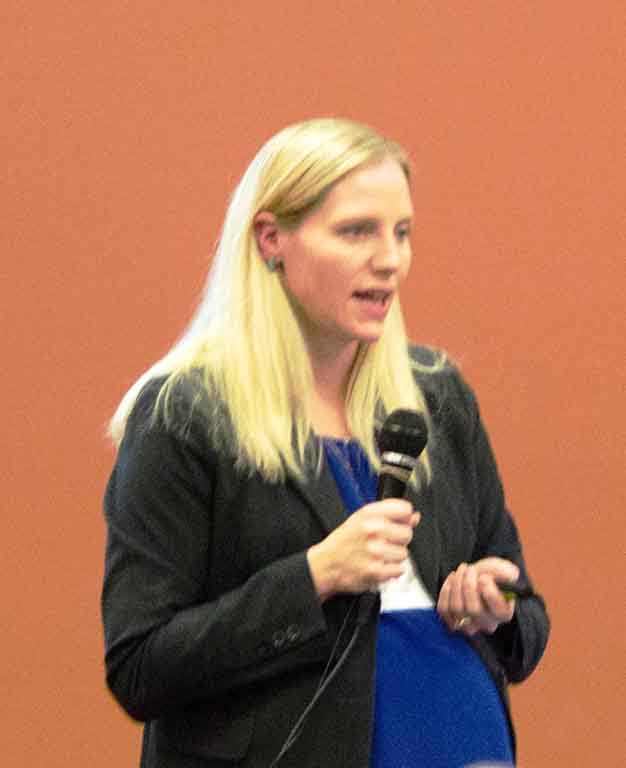- Medical Matters
Polycystic Ovaries: Old is New Again With Robotic Ovarian Wedge Resections
by Amie Holmes, MD, OBGYN, NaPro Surgeon
Polycystic ovaries (PCO) is a relatively common condition that affects four to six percent of reproductive-aged women. As the name suggests, the ovaries contain many small cysts. These cysts create a classic appearance on ultrasound called “string of pearls” because the small cysts line up around the periphery of the ovary. The ovaries are larger than normal and appear smooth, white and glistening when viewed during surgery. The chemical environment of the ovaries is imbalanced and creates a state of estrogen-dominance and androgen (male hormone) excess.
Polycystic ovarian syndrome (PCOS) is a spectrum of disease that includes polycystic ovaries (PCO), irregular menstrual cycles, increased facial hair growth or acne, and difficulty achieving pregnancy. Not all of these conditions are required for a diagnosis of PCOS. While the cause is still unknown, genetic and environmental factors are both implicated.
There are many health risks associated with PCOS. Approximately 50% of women with PCOS are overweight. Women with PCOS also tend to have higher levels of cholesterol and higher blood pressures. There is an increased lifetime risk for cardiovascular disease. Insulin resistance and glucose intolerance are frequently associated with PCOS, and these patients are at risk of developing diabetes. Irregular menstrual cycles and estrogen dominance increase the risk for endometrial cancer and breast cancer. Many women with PCOS experience infertility, which is also associated with numerous health risks.
Frequently, women with PCOS are placed on oral contraceptive pills (OCPs) to “regulate their cycles.” Many women are opposed to OCPs because of the associated health risks and ethical concerns. Also, OCPs do not result in a return to normal cycles but simply “mimic” menstrual cycles by producing withdrawal bleeding. They do not correct the underlying problem but simply provide a “band-aid” approach.
In the 1930s, Stein and Leventhal developed a surgical technique called ovarian wedge resection (OWR). A wedge of tissue was removed from the enlarged, polycystic ovary to reduce it to normal size. OWR was shown to improve natural ovulation, regulate menstrual cycles and improve conception rates. Initially, OWRs were performed by laparotomy in such a way that predisposed the patient to the development of adhesions.
This technique was largely abandoned after the development of clomiphene citrate for ovulation induction and assisted reproductive technologies (ART), most notably in-vitro fertilization (IVF). However, the success of these techniques is considerably lower than OWR success rate (35-50% with clomiphene citrate compared to 85% with OWR). Also, many couples prefer to conceive naturally.
Modest weight loss and exercise are beneficial to overweight women with PCOS. There is a role for insulin-sensitizing medication (such as Metformin or the newer nutritional supplement Myo-Inositol) in the treatment of PCOS, particularly those with diagnosed insulin resistance. Cyclic progesterone (preferably in the luteal phase) can help to regulate menstrual cycles and minimize risks such as endometrial cancer. However, medical treatment is required long-term and does not cure the underlying disease.
There has been a significant lack of research on OWRs after the development of clomiphene citrate and IVF. Some research has been performed on an alternative technique called ovarian drilling; however, postoperative adhesion formation is high with this technique.
Research at the Pope Paul VI Institute in Omaha, Nebraska focuses on restoring natural fertility. This approach has been termed “NaPro” (Natural Procreative) Technology. Under the leadership of Dr. Thomas Hilgers, physicians at PPVI have applied the minimally invasive technique of robotic surgery with laser incision and suture closure of the ovary along with other adhesion prevention techniques. This surgery is performed as an outpatient and has the added benefit of a quick recovery time. Robotic OWR has resulted in near adhesion free surgery and excellent pregnancy success rates.
Most women have regular menstrual cycles after undergoing OWR. Women frequently conceive naturally and often have more than one pregnancy (as opposed to a single pregnancy achieved through ART). Androgen levels decrease substantially. A recent pilot study performed at PPVI demonstrates immediate improvement in insulin resistance and glucose tolerance after OWR. Most, if not all, long-term health risks associated with PCOS are reduced or eliminated.
OWR is considered “as close to a cure” as we have for PCOS in modern-day medicine. There is hope for women with PCOS who want to improve their overall health and/or conceive naturally. Hopefully, more patients and physicians will become aware of robotic OWR, and research will continue to progress in this promising area of women’s health.
Hendriks et al., “Why does ovarian surgery in PCOS help? Insight into the endocrine implications of ovarian surgery for ovulation induction in polycystic ovary syndrome,”Human Reproduction Update, 13: 3: 249-264, 2007
Hilgers, Thomas, “Near Adhesion-Free Reconstructive Pelvic Surgery: Three Distinct Phases of Progress Over 23 Years,” Journal of Gynecologic Surgery (26): 1, 2010.
Hilgers, Thomas, The Medical and Surgical Practice of NaPro Technology, PPVI Institute Press, 2004: Ch32(399-402)Ch39(497-501); Ch43(573-590); Ch45(603-605); Ch 65(890); Ch75(1023-1029)
Speroff, Leon and Fritz, Marc, “Anovulation and the Polycystic Ovary,” Clinical Gynecologic Endocrinology and Infertility, Seventh Edition, pp465-491. Stein IF, Leventhal ML: Amenorrhoea associated with bilateral polycstic ovaries. Am J Obstet Gynecol 29: 181-191, 1935.
Dr. Amie Holmes shown here speaking on PCOS at the CANFP Conference in San Francisco in 2015. Her presentation can be ordered on DVD or CD. Having just completed a NaProTechnology fellowship at the Pope Paul VI Institute in Omaha, NE, she returned to her native California, with her husband Dr. Jonathan Holmes (a general surgeon) and their four children. She opened a NaPro practice with St. Agnes Medical Cener in Fresno, CA. Dr. Holmes left her hometown of Torrance CA in 2003 to attend medical school at Ohio State University College of Medicine and Public Health, and completed her OBGYN residency at the West Penn Allegheny Health System in Pittsburgh, PA and John Peter Smith Hospital in Forth Worth TX.
About The Author



